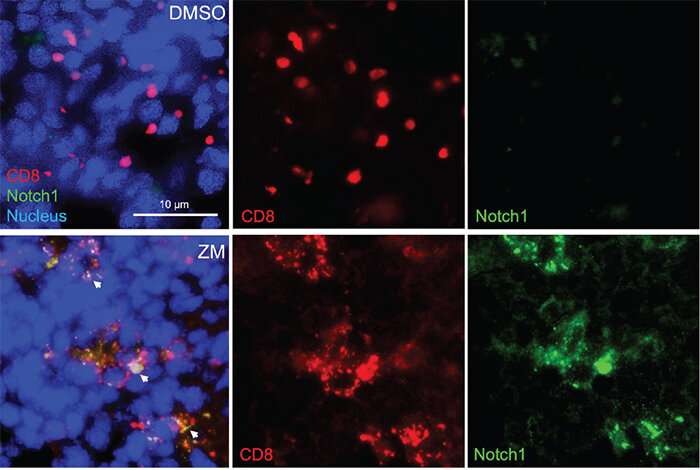Credit: Frontiers in Immunology DOI: 10.3389/fimmu.2022.987298
A study led by LSU Health New Orleans cancer researchers describes a novel therapeutic strategy to overcome tumor-induced immunosuppression. For the first time, the research team identified a critical immunosuppressive pathway and a promising approach to intervene, protecting the ability of T-cells to attack cancer cells. Results are published in Frontiers in Immunology.
"Immunotherapy is one of the most promising areas in oncology," notes senior author Lucio Miele, MD, Ph.D., Assistant Dean for Translational Research at LSU Health New Orleans School of Medicine, who is also a cancer researcher. "Our immune systems are capable of destroying cancer cells, and several approved and experimental drugs stimulate cancer immunity. But cancers fight back, producing substances that weaken immune cells."
The immune system cells that kill cancer cells are called CD8 T-cells. To be effective, CD8 T-cells need a protein made by the NOTCH1 gene.
"We had already described how adenosine, an immune-suppressive substance released by tumor cells, causes the breakdown of NOTCH1, weakening T-cells," says Dr. Miele.
Using a proteomics strategy, the LSU Health New Orleans research team led by postdoctoral researcher Giulia Monticone, Ph.D., determined what causes the breakdown of NOTCH1 in T-cells. It is an enzyme called CBL-B. Collaborating with a Massachusetts biotech firm that is developing CBL-B inhibitors, the scientists were able to show that their experimental inhibitors do protect NOTCH1 from breaking down in CD8 T-cells and make them far more effective in killing breast and colorectal cancer cells.
"When added to existing immunotherapeutics, these CBL-B inhibitors greatly increased their potency," Dr. Miele adds. "This new strategy could expand the efficacy of cancer immunotherapy by making patients' T-cells able to evade the immune-suppressive defenses of tumors."
More information: Giulia Monticone et al, Targeting the Cbl-b-Notch1 axis as a novel immunotherapeutic strategy to boost CD8+ T-cell responses, Frontiers in Immunology (2022). DOI: 10.3389/fimmu.2022.987298
Journal information: Frontiers in Immunology
Provided by Louisiana State University
























